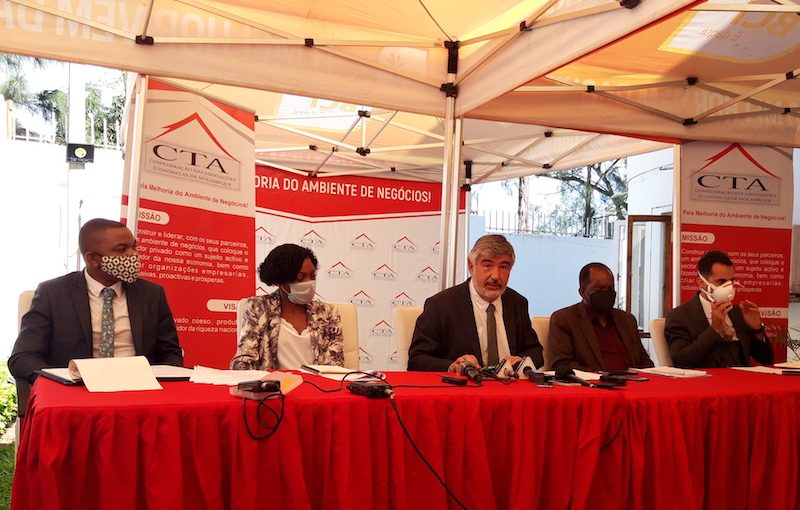Mozambique: Government denies blocking licensing of Solenta Aviation
Mozambique: Business sector takes a stand on government measures to mitigate the impact of Covid-19

Photo: A Verdade
Entrepreneurs in Mozambique took a stand on the measures announced by the government to mitigate the impact of the Covid-19 pandemic, A Verdade reports.
In the “measures announced by the Council of Ministers, it was clear that they referred to the taxable persons covered by the IRPC, and this gave the private sector great hope,” Onório Boane said on Thursday (May 7). But, in effect, it was found that “an eligible company is only one that submitted, in 2019, an annual turnover not exceeding 2.5 million meticais [around US$36,000 at current exchange rates],” and so only applied to small companies.
In addition, employers demand “[for them to] continue to function and to maintain their workforce, it is vital that the cost of electricity is reduced”.
A day after Standard Bank’s barometer on the real economy [PMI Business Activity Index] reported “a sharp deterioration in the health of the private sector in Mozambique” during the first month of the State of Emergency, employers revealed themselves disappointed by the measures the Nyusi executive had put in place to mitigate the economic effects of the Covid-19 pandemic.
ALSO READ: Mozambique PMI Business Activity Index Falls to Record Low
Onório Boane, director general of Beleluane Industrial Park, said at a press conference this Thursday ( May 7) that, after the 12th session of the Council of Ministers, businesspeople and the public generally had listened to the announcement with appreciation and approval.
“Among other instruments, the decree approved certain customs and tax facilities within the scope of the mitigation measures. These customs and tax facilities apply to economic agents subject to the taxes in force and consist, namely, in the authorisation of early exits [withdrawal of goods subject or not to the payment of duties and other taxes, with the authorisation of the competent entity, and without the complete fulfilment of customs formalities]; in the importation of products for the prevention and treatment of Covid-19; in the exemption of payments on account; in the postponement of special payment on account and in the authorisation for the offsetting of credits related to value added tax (VAT), of which the taxpayer is the holder; and with debts related to taxes of a different nature in charge of the tax administration.”
“In these measures announced by the communiqué of the Council of Ministers, it was clear that they referred to the taxable persons covered by the IRPC, and this gave the private sector great hope.
“However, in carrying out the measures and at the level of the IRPC, the government, in its article 3, of Decree No. 23/2020, of 27 April, says, in its subparagraph a) that only companies that submitted, in 2019, an annual turnover of more than 2,500,000.00 Mt were eligible.
Medium and large companies must be eligible too
“Meanwhile, looking into the Law, it is noted, by the provisions of Article 47 of the IRPC Code, that the general regime applicable to taxable persons whose turnover does not exceed 2,500,000.00 Meticais, is that of the ISPC [Simplified Tax for Small Contributors] and not that of the Corporate Income Tax IRPC, unless otherwise determined by the Law and when, due to the express will of the taxpayer, he chooses to have organised accounting,” Boane quoted, pointing out that this characterises the turnover of small companies.
Onório Boane echoed the business sector’s request that, “in order to make this special Covid-19 tax facility comprehensive and applicable to companies under the IRPC regime, it is necessary [for the government] to increase the volume of business annual turnover required of companies [in order to be eligible ]”.
Covid-19 will affect the income of 230,000 small farmers in Mozambique
Focusing on the industrial sector in particular, Onório Boane said that the sector “registered a reduction in the level of productive activity of more than 70 percent, which resulted in a drop in turnover for companies in this sector by a monthly average of 60 percent, corresponding to an estimated revenue loss of about four billion meticais per month, with the emphasis on the soft drinks and sugar, oil and soap industries, which recorded monthly billing losses estimated at between 40 percent and 65 percent”.
Boane said that about 80,000 small farmers who produce corn and cassava will see their income compromised by reduced production in the beer industry.
“The same scenario can be seen in the cotton industry, which involves around 150,000 small farmers in the initial phase of the value chain, who annually produce and sell around 45,000 tons of seed cotton. With the fall in the price of cotton on the international market by around 30 per cent, it is estimated that the sale price to the producer may fall from the current 23.3 meticais per kilogram to 17 meticais/kg, resulting in an estimated loss of income for farmers of 283.5 million meticais.”
ALSO READ: Watch: Mozambique industry losing 4 billion meticais each month amidst Covid-19 crisis
Private sector “wants to make sure the economy doesn’t stop and has a future after the pandemic”
Another concern for industrialists in Mozambique is high production costs, particularly of electricity, which represents 12 percent of overall costs, adding up to monthly bills of around five million meticais. Entrepreneurs are asking for a 50 percent reduction in tariffs for a period of six months.
Fernando Oliveira, chief executive officer of Sumol /Compal Mozambique addressed the matter of fixed costs.
“What distinguishes craft from industry is the consumption of energy and fuel. At this time, it is very important that all actors stand united and contribute to the survival of our industry.
“It is essential that those economic sectors that cannot continue to function, like tourism, for example, are not burdened with fixed energy costs that do not correspond to their activity.
“One of the measures we advocate is the reduction of fixed energy costs at this stage,”
Oliveira explained that “For industries, energy is a fundamental part of their production process, and, at this time, energy [in Mozambique] costs more than in our southern African counterparts.
“Energy has experienced a very strong increase [in price] in the last two years, and we think that it is very important to support the work of industry.
“For companies to be able to continue to function and to maintain their workforce at current strength, it is very important that the energy bill is reduced and therefore what we propose is also that, for the industries in particular, a reduction in the energy bill is considered at a time when we are all labouring under this difficulty”.
The head of the largest juice company in Mozambique was unable to specify exactly how many thousands of workers would be affected if the national industry collapsed, but indicated that “to date, around 1,800 jobs have been suspended, as per the law”.
ALSO READ: Mozambique:INSS must establish mechanisms to help companies in difficulties save jobs – CTA
Oliveira made it clear that “there is no industrialist or entrepreneur in Mozambique who does not have as their main priority maintaining his or her activity. We all want to keep workers on and keep the economy from stalling so that we have a future after the pandemic”, and for that, “the private sector is not asking the state for anything it is not also contributing to”.
By Adérito Caldeira















Leave a Reply
Be the First to Comment!
You must be logged in to post a comment.
You must be logged in to post a comment.